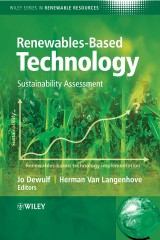Details

Renewables-Based Technology
Sustainability AssessmentWiley Series in Renewable Resource 1. Aufl.
|
136,99 € |
|
| Verlag: | Wiley |
| Format: | |
| Veröffentl.: | 14.06.2006 |
| ISBN/EAN: | 9780470022436 |
| Sprache: | englisch |
| Anzahl Seiten: | 384 |
DRM-geschütztes eBook, Sie benötigen z.B. Adobe Digital Editions und eine Adobe ID zum Lesen.
Beschreibungen
Sustainability is a key driving force for industries in the chemical, food, packaging, agricultural and pharmaceutical sectors, and quantitative sustainability indicators are being incorporated into company reports. This is driving the uptake of renewable resources and the adoption of renewables.<br /> Renewables' can either be the substituted raw materials that are used in a given industry, (e.g. the use of biomass for fuel); the use and/or modification of a crop for use in a new industry (e.g. plant cellulose), or the reuse of a waste product (e.g. organic waste for energy production). <p>This is the first book in the <i>Wiley Renewable Resources</i> series that brings together the range of sustainability assessment methods and their uses. Ensuing books in the series will look at individual renewable materials and applications.</p>
<b>Contributors.</b> <p><b>Foreword.</b></p> <p><b>Series Preface.</b></p> <p><b>Preface.</b></p> <p><b>List of Abbreviations.</b></p> <p><b>Part I: Renewables as a Resource and Sustainability Performance Indicators.</b></p> <p><b>1 The Contribution of Renewables to Society</b> (<i>Göran Berndes</i>).</p> <p><b>2 The Potential of Renewables as a Feedstock for Chemistry and Energy</b> (<i>Wilfried G. J. H. M. van Sark, Martin K. Patel, André P. C. Faaij and Monique M. Hoogwijk</i>).</p> <p><b>3 Sustainability Performance Indicators</b> (<i>Alexei Lapkin</i>).</p> <p><b>Part II: Relevant Assessment Tools.</b></p> <p><b>4 Life Cycle Inventory Analysis Applied to Renewable Resources</b> (<i>Niels Jungbluth and Rolf Frischknecht</i>).</p> <p><b>5 Net Energy Balancing and Fuel-Cycle Analysis</b> (<i>Hosein Shapouri, Michael Wang and James A. Duffield</i>).</p> <p><b>6 Life Cycle Assessment as an Environmental Sustainability Tool</b> (<i>Adisa Azapagic</i>).</p> <p><b>7 Exergy</b> (<i>Jo Dewulf and Herman Van Langenhove</i>).</p> <p><b>8 Material Flow Analysis and the Use of Renewables from a Systems Perspective</b> (<i>Stefan Bringezu</i>).</p> <p><b>9 Ecological Footprints and Biocapacity: Essential Elements in Sustainability Assessment</b> (<i>William E. Rees</i>).</p> <p><b>10 The Sustainable Process Index (SPI)</b> (<i>Michael Narodoslawsky and Anneliese Niederl</i>).</p> <p><b>Part III:Case Studies.</b></p> <p><b>11 Assessment of Sustainable Land Use in Producing Biomass</b> (<i>Helmut Haberl and Karl-Heinz Erb</i>).</p> <p><b>12 Assessment of the Forest Products Industries</b> (<i>Klaus Richter, Frank Werner and Hans-Jörg Althaus</i>).</p> <p><b>13 Assessment of the Energy Production Industry: Modern Options for Producing Secondary Energy Carriers from Biomass</b> (<i>André Faaij</i>).</p> <p><b>14 Assessment of Biofuels</b> (<i>James A. Duffield, Hosein Shapouri and Michael Wang</i>).</p> <p><b>15 Assessment of Organic Waste Treatment</b> (<i>Jan-Olov Sundqvist</i>).</p> <p><b>16 Oleochemical and Petrochemical Surfactants: An Overall Assessment</b> (<i>Erwan Saouter, Gert Van Hoof, Mark Stalmans and Alan Brunskill</i>).</p> <p><b>17 Assessment of Bio-Based Packaging Materials</b> (<i>Andreas Detzel, Martina Krüger and Axel Ostermayer</i>).</p> <p><b>18 Assessment of Biotechnology-Based Chemicals</b> (<i>Peter Saling and Andreas Kicherer</i>).</p> <p><b>19 Assessment of Bio-Based Pharmaceuticals: The Cephalexin Case</b> (<i>Alle Bruggink and Peter Nossin</i>).</p> <p><b>Part IV:Conclusions.</b></p> <p><b>20 Conclusions</b> (<i>Jo Dewulf and Herman Van Langenhove</i>).</p> <p><b>Index.</b></p>
<p>Editors: <strong>Prof Dr Jo Dewulf, Prof Dr Herman van Langenhove</strong>, both of Ghent University, Belgium. Both experienced researchers in environmental chemistry and clean technology.
The concepts 'renewable recources' and 'sustainability' are receiving much attention by academia, governments and industry. With the current rate of consumption we have fossil oil reserves left for 40 years. Renewable resources are of key importance for the development of a sustainable society and it is vital that governmental and business decision-makers are equiped with adequate assessment tools. <p><i>Renewables-Based Technology: Sustainability Assessment</i> brings together and evaluates the main sustainability assessment methods and techniques in one volume.</p> <p>Structured into three main section, Part One introduces the quantitative assessment of renewables, their potential as feedstock for industry, and an overview of sustainability performance indicators. Part Two introduces the key sustainability methods and techniques that are currently used. Part Three contextualises these methods by providing case studies that are set within the major industries benefiting from renewables.</p> <ul> <li> <div>Links the two issues of sustainability assessment and renewable resources.</div> </li> <li> <div>Includes case studies from the major industries that can benefit from using renewable resources, such as agriculture, biotechnology, food packaging, energy-biofuel, bio-polymer, bio-pharmaceutical and organic waste treatment.</div> </li> <li> <div>Written by a global team of authors from academia, governmental departments, research centres and international companies.</div> </li> </ul> <p>This book will be a main source of information for professionals from a range of agricultural, chemistry, chemical and process industries. Also researchers within departments of agriculture, chemistry, chemical engineering, food technology, environmental technology, who are looking at sustainability or clean technology issues.It will also be a valuable reference for upper-level undergraduate and Master students. </p>
Diese Produkte könnten Sie auch interessieren:

Microbes Based Approaches for the Management of Hazardous Contaminants

von: Ajay Kumar, Livleen Shukla, Joginder Singh, Luiz Fernando Romanholo Ferreira

165,99 €

Health Risk Assessment for Asbestos and Other Fibrous Minerals

von: Andrey Korchevskiy, James Rasmuson, Eric Rasmuson

154,99 €















